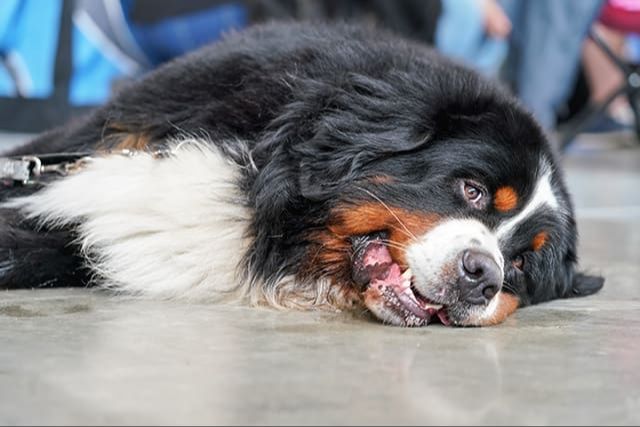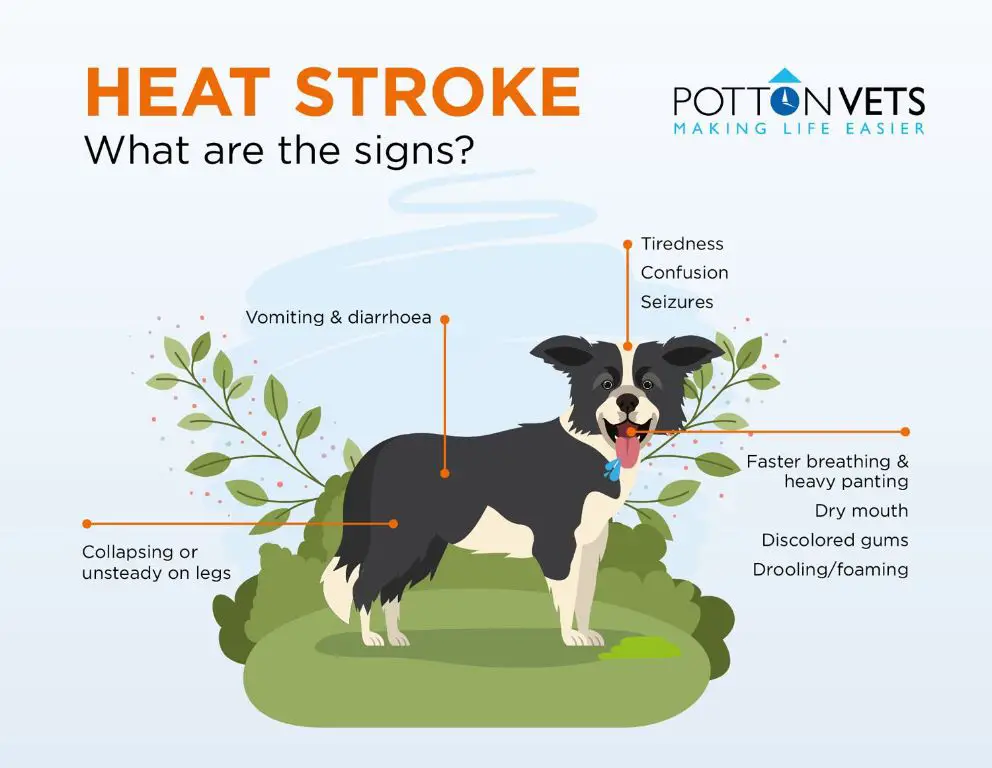Introduction
It’s normal for a healthy dog to have a cool, wet nose. So when a dog develops a warm, dry nose along with lethargy, it can be cause for concern. A warm, dry nose is often accompanied by other symptoms like excessive panting, vomiting, diarrhea, or lack of appetite. While not an emergency, these symptoms in combination may indicate an underlying health issue that requires veterinary attention. Some of the most common causes include dehydration, fever, heat stroke, kennel cough, and certain heart conditions. If the symptoms persist or worsen, it’s important to have a veterinarian examine your dog to diagnose and treat the underlying condition.
Common Causes
There are a few common reasons why your dog may have a warm, dry nose and lethargy:
Dehydration
Dehydration occurs when your dog loses more fluids than they take in. Vomiting, diarrhea, excessive panting, and high fever can all lead to dehydration. As your dog becomes dehydrated, their blood volume drops which leads to decreased blood flow. This causes your dog’s nose to become dry.

Fever
If your dog has a high fever, their body will divert blood flow to the vital internal organs and away from the extremities like the nose. This lack of blood flow causes the nasal membranes to dry out.
Exposure to Heat or Dry Air
Dogs pant to help cool themselves down. Excessive panting in hot environments or dry air can lead to drying of the nasal passages and membranes.
When to See the Vet
If your dog is exhibiting a dry nose along with lethargy, it’s important to monitor them closely and contact your vet if symptoms persist more than 24 hours. Lethargy and dry nose can be normal short-term responses to things like weather changes or exertion. However, extended lethargy along with a persistently dry nose could indicate an underlying health issue that requires veterinary attention.
In particular, you’ll want to contact your vet promptly if your dog is extremely lethargic or unresponsive. This level of lethargy is not normal and may be a sign of a serious condition requiring emergency care. Don’t wait to see if your dog improves – get them to the vet right away if they seem extremely listless or unable to move.
A dry nose paired with extended lethargy can potentially indicate dehydration, fever, heat stroke, kennel cough, or an underlying heart condition. Your vet can examine your dog and run tests to pinpoint the cause and recommend appropriate treatment. The sooner you seek veterinary care, the better the outcome is likely to be.
Bottom line – if your dog’s dry nose and lethargy last more than 24 hours, err on the side of caution and contact your vet. They can determine if your dog needs fluids, rest, medication, or other intervention to get back to full health.
Dehydration
Dehydration is one of the most common causes for a dry nose and lethargy in dogs. When a dog becomes dehydrated, the mucous membranes in the nose and mouth lose moisture and become dry. The signs of dehydration include:
- Dry or sticky gums
- Sunken eyes
- Loss of skin elasticity or tenting skin
- Increased panting
- Lethargy and depression
- Loss of appetite
- Rapid heart rate
- Weakness or collapse
Dehydration can occur for a variety of reasons including inadequate water intake, excessive fluid losses from vomiting, diarrhea or heavy exertion, and dogs with underlying health issues like kidney disease. Treatment involves slowly increasing fluid intake by offering small amounts of water frequently, oral rehydration solutions, or giving intravenous fluids in severe cases. Addressing any underlying cause of dehydration like an intestinal issue is also important. Keeping your dog hydrated by providing clean drinking water at all times can help prevent dehydration from occurring.
Fever

A fever in dogs often occurs when their body temperature rises above the normal range of 100-102.5 degrees Fahrenheit. Fevers are a common sign of infection or inflammation in the body. The most common causes of fever in dogs include:
- Viral or bacterial infections
- Immune-mediated diseases
- Cancer or tumors
- Exposure to toxins
- Inflammation and tissue damage
Some of the most noticeable symptoms of fever in dogs include:
- Warm, dry nose
- Panting and shivering
- Lack of appetite
- Lethargy and lack of energy
- Dehydration
Treatment for fever in dogs often includes reducing the body temperature and addressing the underlying cause. This may involve:
- Cold compresses to the head, neck, and paws
- Medications like non-steroidal anti-inflammatories
- Antibiotics for infections
- Intravenous fluids for dehydration
- Medication to reduce immune system overactivity
It’s important to identify and treat the cause of a fever, not just the fever itself. Left untreated, certain infections can quickly become life-threatening. Seek veterinary care right away if your dog has a temperature over 104 F, symptoms last more than 24 hours, or additional concerning symptoms develop.
Heat Stroke
Heat stroke is a life-threatening condition that can occur when a dog’s body temperature rises to dangerous levels. It is an emergency and requires immediate veterinary treatment.

Some common signs of heat stroke in dogs include:
- Panting excessively
- Bright red gums
- Rapid heart rate
- Lethargy, weakness
- Dizziness or disorientation
- Vomiting
- Collapse
- Seizures
Heat stroke is usually caused by excessive exposure to high environmental temperatures, combined with an inability to properly regulate body temperature. Risk factors include being in a hot car or outside in the sun for too long without adequate shade or water. Older dogs, obese dogs, and dogs with heart/lung disease are more susceptible.
Heat stroke is a true medical emergency requiring prompt veterinary treatment to prevent severe organ damage, brain damage, or death. Treatment focuses on cooling the dog down gradually and restoring hydration/electrolyte balance. More severely affected dogs may need oxygen therapy, IV fluids, medication, and supportive care. Prevention involves adequate shade/ventilation, access to water, avoiding hot vehicles, and monitoring dogs closely when it’s hot out.
Kennel Cough
Kennel cough, also known as canine infectious tracheobronchitis, is a highly contagious respiratory infection in dogs. It’s caused by both viral and bacterial pathogens, including bordetella bronchiseptica and canine parainfluenza virus.

The most common symptoms of kennel cough include:
- A forceful, hacking “honking” cough
- Gagging or retching motions
- Runny nose
- Sneezing
- Lethargy
- Loss of appetite
Kennel cough is spread through the air and by direct contact between infected dogs. It can occur anywhere dogs congregate, like kennels, dog daycares, shelters, dog shows, and parks.
Most cases of kennel cough resolve on their own within a few weeks. However, antibiotics may be prescribed by your vet to treat secondary bacterial infections. Cough suppressants may provide temporary relief of symptoms. The bordetella vaccine can help prevent infection but is not 100% effective.
To reduce the spread of illness, isolate dogs with kennel cough from other pets. Disinfect their food bowls, toys, bedding, and living areas. Keep infected dogs away from kennels, parks, etc. until symptoms fully resolve.
Heart Conditions
Heart conditions like congestive heart failure can cause a dog’s nose to become dry along with other symptoms like lethargy. Some common symptoms of heart conditions that could lead to a dry nose in dogs include:
- Fatigue and tiring more easily
- Coughing
- Difficulty breathing or rapid breathing
- Weight loss
- Lack of appetite
- Fainting
Heart disease in dogs can be caused by a number of factors like heartworm disease, heart defects and abnormalities, heart valve issues, cardiomyopathy, and more. Some breeds may also be genetically predisposed to certain heart conditions.
Treatment for heart disease in dogs usually includes medications like ACE inhibitors, beta blockers, and diuretics. Lifestyle changes like dietary modifications and limited exercise may also be recommended. In severe cases, oxygen therapy, surgery, or a pacemaker may be necessary.
If a dog’s dry nose occurs alongside other symptoms like fatigue and breathing issues, it’s important to see the vet right away for an evaluation of the heart. Prompt treatment can greatly improve quality of life and life expectancy for dogs with heart disease.
When to Seek Emergency Care
There are some signs of lethargy in dogs that warrant immediate emergency veterinary care. If your dog is having trouble breathing, has collapsed, or is experiencing seizures along with lethargy, you should seek emergency vet care right away.
Trouble breathing in a lethargic dog is a very concerning sign that something is seriously wrong. This could be due to fluid in the lungs, pneumonia, a foreign object stuck in the airway, or other respiratory distress. Breathing issues need rapid treatment, so take your dog to emergency vet services if you notice any unusual breathing patterns, choking sounds, open-mouth breathing, or the tongue or gums turning blue.
Collapse or loss of consciousness is an emergency red flag. This suggests your dog’s condition is rapidly deteriorating. Unconsciousness or inability to stand up or hold up their head indicates a problem like low blood pressure, seizure, poisoning, shock, or a neurological issue. Don’t hesitate to get emergency care if your lethargic dog collapses or will not wake up.
Seizures or convulsions are another critical sign of emergency. Seizures indicate something is going wrong in the brain, whether caused by toxicity, low blood sugar, fever, or another medical condition. They can lead to brain damage and death without swift treatment. If your lethargic dog experiences a seizure, call the emergency vet right away.
Prevention
Prevention is key when it comes to keeping your dog’s nose warm and moist. Here are some tips:
Ensure Proper Hydration
Dehydration is a common cause of dry nose and lethargy in dogs. Make sure your dog has access to fresh, clean water at all times. You can encourage drinking by adding some wet food to their kibble or switching to a wet dog food diet. Place water bowls around your home and yard.
Avoid Overheating
Dogs are susceptible to overheating, which can lead to dehydration and dry nose. Avoid strenuous exercise on hot days. Ensure your dog has access to shade when outdoors. Never leave your dog in a hot car.
Routine Vet Visits
Your vet can check for underlying conditions that may be causing your dog’s symptoms. Bloodwork and a physical exam can identify issues like kidney disease, diabetes, infections, and more. Preventative care from your vet helps catch issues early.